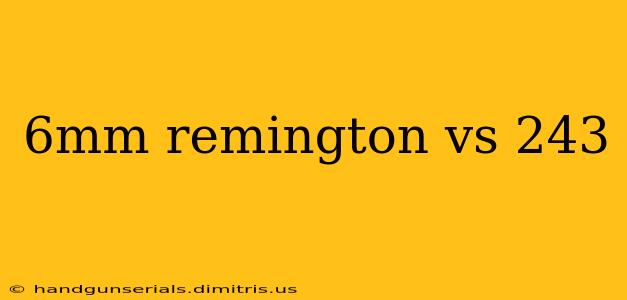Choosing the right cartridge can significantly impact your hunting or shooting experience. The 6mm Remington and the .243 Winchester are both popular choices in the 6mm caliber range, but they offer distinct advantages and disadvantages. This in-depth comparison will help you decide which cartridge best suits your needs.
Ballistics: A Head-to-Head Comparison
Both the 6mm Remington and .243 Winchester are known for their accuracy and flat trajectories, making them excellent choices for long-range shooting. However, subtle differences exist in their ballistic performance:
Velocity and Energy:
-
.243 Winchester: Generally offers slightly higher velocities and energy at longer ranges, especially with heavier bullets. This translates to flatter trajectories and greater downrange effectiveness. Many factory loads push .243 Win bullets to velocities exceeding 3000 fps.
-
6mm Remington: While capable of impressive accuracy, it typically delivers slightly lower velocities compared to the .243 Winchester, particularly with comparable bullet weights. The difference isn't drastic, but it's noticeable in extended-range scenarios.
Recoil:
Both cartridges are relatively mild-recoiling, making them suitable for newer shooters. The .243 Winchester generally produces slightly more recoil due to its higher velocity, though the difference is minimal and often negligible for experienced shooters.
Bullet Selection:
Both calibers offer a wide variety of bullet weights and designs, catering to various hunting applications. However, the slightly larger .243 Winchester case can accommodate slightly heavier bullets, offering more options for long-range hunting.
Hunting Applications: Which Cartridge Reigns Supreme?
Both cartridges are highly versatile and effective for various hunting applications, including:
-
Varmints: Both excel at taking varmints like prairie dogs, coyotes, and groundhogs. Their accuracy and flat trajectories make precise shots at longer distances easier.
-
Deer Hunting: Both are suitable for deer hunting, particularly at moderate ranges. The .243 Winchester's slightly higher energy may provide a marginal advantage on larger deer or at longer distances. Proper shot placement is paramount regardless of cartridge choice.
-
Antelope and Pronghorn: Both cartridges are effective choices for antelope hunting, again emphasizing accurate shot placement. The .243 Winchester's energy advantage might be slightly more beneficial on these faster-moving animals.
Rifle Availability and Cost:
Both cartridges are widely available, meaning finding rifles in either chambering should be relatively straightforward. The cost of ammunition and rifles varies depending on brand, quality, and current market conditions. Generally, there's little difference in price between the two.
Which Cartridge Should You Choose?
The "better" cartridge depends entirely on your specific needs and preferences. Here's a breakdown to help you decide:
-
Choose the .243 Winchester if: You prioritize slightly higher velocity and energy, particularly for long-range shooting or larger game. A slightly wider selection of factory ammo weights might also be a consideration.
-
Choose the 6mm Remington if: You prefer a cartridge known for its exceptional accuracy and mild recoil, and you don't require the marginal increase in velocity offered by the .243 Winchester. Many shooters find the 6mm Remington to be extremely accurate in their rifles.
Ultimately, the best way to determine which cartridge is right for you is to try both if possible. Rentals at shooting ranges or borrowing from friends can provide valuable hands-on experience before making a significant investment. Consider your intended game, shooting distance, and personal preferences to make an informed decision.

